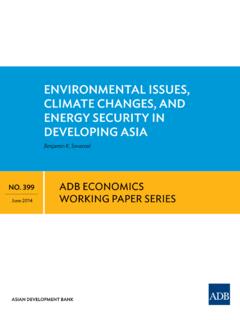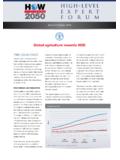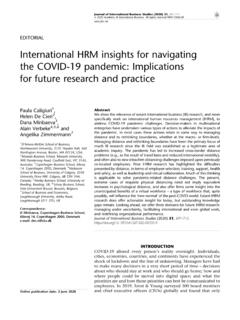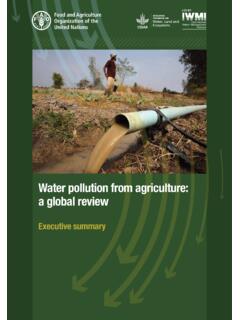Transcription of Analysis of Key Drivers of Deforestation and Forest ...
1 Analysis of Key Drivers of Deforestation andForest Degradation in the Philippines01 ImprintThis publication is by the Deutsche Gesellschaft f r Internationale Zusammenarbeit through the Climate-relevant Modernization of the National Forest Policy and Piloting of Reducing Emissions from Deforestation and Forest Degradation (REDD) Measures in the Philippines Project, funded by the German Federal Ministry for the Environment, Nature Conservation and Nuclear Safety (BMU) under its International Climate BMU supports this Initiative based on a decision of the German Parliament. For more information see a federally owned enterprise, GIZ supports the German Government in achieving its objectives in the field of international cooperation for sustainable from named contributors do not necessarily reflect the views of the publisher.
2 Published byDeutsche Gesellschaft f r Internationale Zusammenarbeit (GIZ) GmbHRegistered officesBonn and Eschborn, GermanyT +49 228 44 60-0 (Bonn)T +49 61 96 79-0 (Eschborn)ResponsibleFor. Ricardo L. CalderonDirectorDepartment of Environment and Natural Resouces- Forest Management BureauForest Management Bureau Building, Visayas Avenue, Quezon City 1101 PhilippinesT: 63 2 928 9313 / 927 4788Dr. Bernd-Markus LissPrincipal AdvisorClimate-relevant Modernization of Forest Policy and Piloting of REDDC2/F PDCP Bank Centre Building, Rufino corner Leviste StreetsSalcedo Village, Makati City 1227 PhilippinesE: +63 2 651 5140 Authors / ResearchersAntonio P. Carandang, Leonida A. Bugayong, Priscila C.
3 Dolom, Leni N. Garcia, Ma. Magdalena B. Villanueva, Nena O. Espiritu and the Forestry Development Center, University of the Philippines Los Banos - College of Forestry and Natural ResourcesCopyright on PhotosThe photos in this publication are owned by GIZ unless otherwise indicated in the geographical maps are for information purposes only and do not constitute recognition under international law of boundaries and territories. GIZ does not guarantee in any way the current status, accuracy and completeness of the maps. All liability for any loss or damage arising directly or indirectly from their use is / DesignRyan G. PalacolPrinted and distributed byDeutsche Gesellschaft f r Internationale Zusammenarbeit (GIZ) GmbHPlace and date of publicationManila, PhilippinesApril 2013 CitationCarandang, Antonio P.
4 Et al. 2013: Analysis of Key Drivers of Deforestation and Forest Degradation in the Philippines. Manila, Philippines: Deutsche Gesellschaft f r Internationale Zusammenarbeit (GIZ) : 978-971-95451-2-5 Analysis of Key Drivers of Deforestation and Forest Degradation in the PhilippinesvForewordThe 2011 Philippine Forestry Statistics of the Forest Management Bureau (FMB) show that based on the interpretation and Analysis of 2003 satellite imageries, the national Forest cover amounts to million hectares or per cent of the country s total land area of around 30 million hectares. While the Deforestation rate has stabilized and even reversed in some areas, the Forest cover is way below the 1934 data of million hectares.
5 The Forest loss affects the national interest to produce goods and ecosystem services and translates to a substantial contribution to greenhouse gas the UNFCCC COP-13 in Bali, Indonesia in December 2007, the international community has called upon countries to explore the concept of reducing emissions from Deforestation and Forest degradation (REDD) as a new mechanism to combine Forest protection with objectives of climate protection, biodiversity conservation and improvement of local livelihoods. In the recent international discussions, the concept has been expanded to include conservation of Forest carbon stocks, sustainable management of forests and enhancement of Forest carbon stocks (REDD-plus).
6 At the country level, the Philippines expressed its high interest to participate as signified by the commitment to adjust its Forest policy to the necessities of climate protection in the context of REDD-plus. In this context, the Government in collaboration with a wide range of actors has established the Philippine National REDD-Plus Strategy (PRNRPS) which has become integral part of the Philippine Development Plan 2011-2016 and the National Climate Change Action Plan 2011-2028. To support the implementation of the PNRPS particularly the REDD-plus readiness phase, the International Climate Initiative of the German Federal Ministry for the Environment, Nature Conservation and Nuclear Safety (BMU) funded the Project Climate-Relevant Modernization of the National Forest Policy and Piloting of REDD Measures in the Philippines.
7 The Project is implemented by GIZ with the DENR as the main partner, in cooperation with local government units (LGUs) and a wide range of stakeholders. In line with the country s efforts towards Forest and climate protection and the development of appropriate policy and instruments for pursuing REDD-plus as foreseen under the PNRPS, the Project supported the conduct of four policy studies in collaboration with key stakeholders: (1) Analysis of Drivers of Deforestation and Forest degradation, (2) Forest policy, (3) Clarifying carbon rights, and (4) Analysis of free prior informed consent (FPIC) implementation. This study aims to assess the key Drivers of Deforestation and Forest degradation, analyze the underlying causes, incentives and relative importance, to develop a policy agenda and to derive differentiated recommendations to address the various Drivers of Deforestation and Forest degradation effectively and to be able to design related REDD+.
8 The study could provide pertinent information to policy makers at local and national levels in looking deeply into the Drivers of Deforestation and Forest degradation and craft necessary policy actions to prevent their occurrence and reduce the negative impacts of climate change through mitigation and adaptation. Understanding the direct and indirect causes of Forest loss would result in a more focused strategy to reduce greenhouse gas emissions and combat global would like to extend our deep appreciation to the study team of the Forestry Development Center headed by Dr. Antonio P. Carandang, for their tireless efforts in gathering secondary data, interviewing relevant stakeholders in the four (4) study sites, analyzing all the information and preparing a comprehensive report that contributes to a better understanding of key Drivers of Deforestation and Forest degradation in the study team acknowledges the support provided by the implementers of the project Climate-relevant Modernisation of the National Forest Policy and Piloting of REDD in the Philippines funded under the International Climate Initiative of the German Federal Ministry for the Environment, Nature Conservation and Nuclear Safety (BMU)
9 And implemented by the Deutsche Gesellschaft f r Internationale Zusammenarbeit (GIZ) GmbH together with the Department of Environment and Natural Resources (DENR). The Forest Management Bureau (FMB) helped oversee the conduct of the four policy studies, among which is the Analysis of Key Drivers of Deforestation and Forest Degradation in the Philippines . The DENR officials from the Central Office, FMB, Regional Offices (4A, 4B, 8, 10), PENROs, and CENROS have kindly assisted us in coordinating our field visits and the conduct of key informant interviews and focus group discussions. The National Commission on Indigenous Peoples (NCIP), from the Commissioners to the Provincial and local officers, were supportive of our research key informants and focus group discussion participants in the four sites General Nakar, Quezon; Southern Leyte; Palawan; and Mount Malindang have been kind enough to provide us with their insights and information that have guided us in the Analysis .
10 We appreciate the active participation of the various barangay officials and community members, indigenous people s organizations, non-government organizations, Forest products and related industries, and local government units that have all been instrumental in making us understand the Drivers of Deforestation and Forest degradation in their sites. The list of KII and FGD participants are in the Appendix appreciation is also forwarded to the officials of the College of Forestry and Natural Resources at the University of the Philippines Los Ba os for always supporting the policy studies of the Forestry Development Center s staff members.







